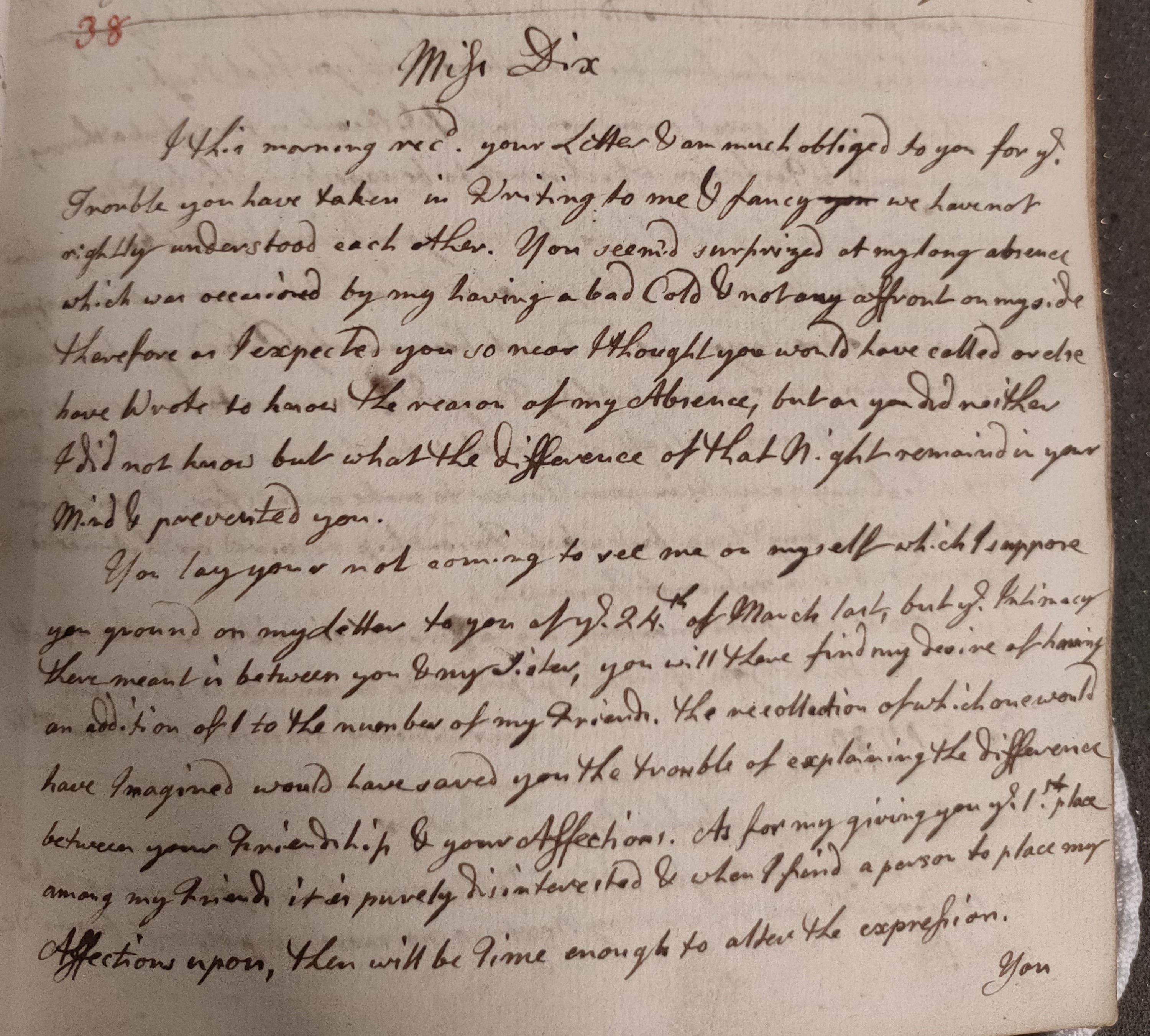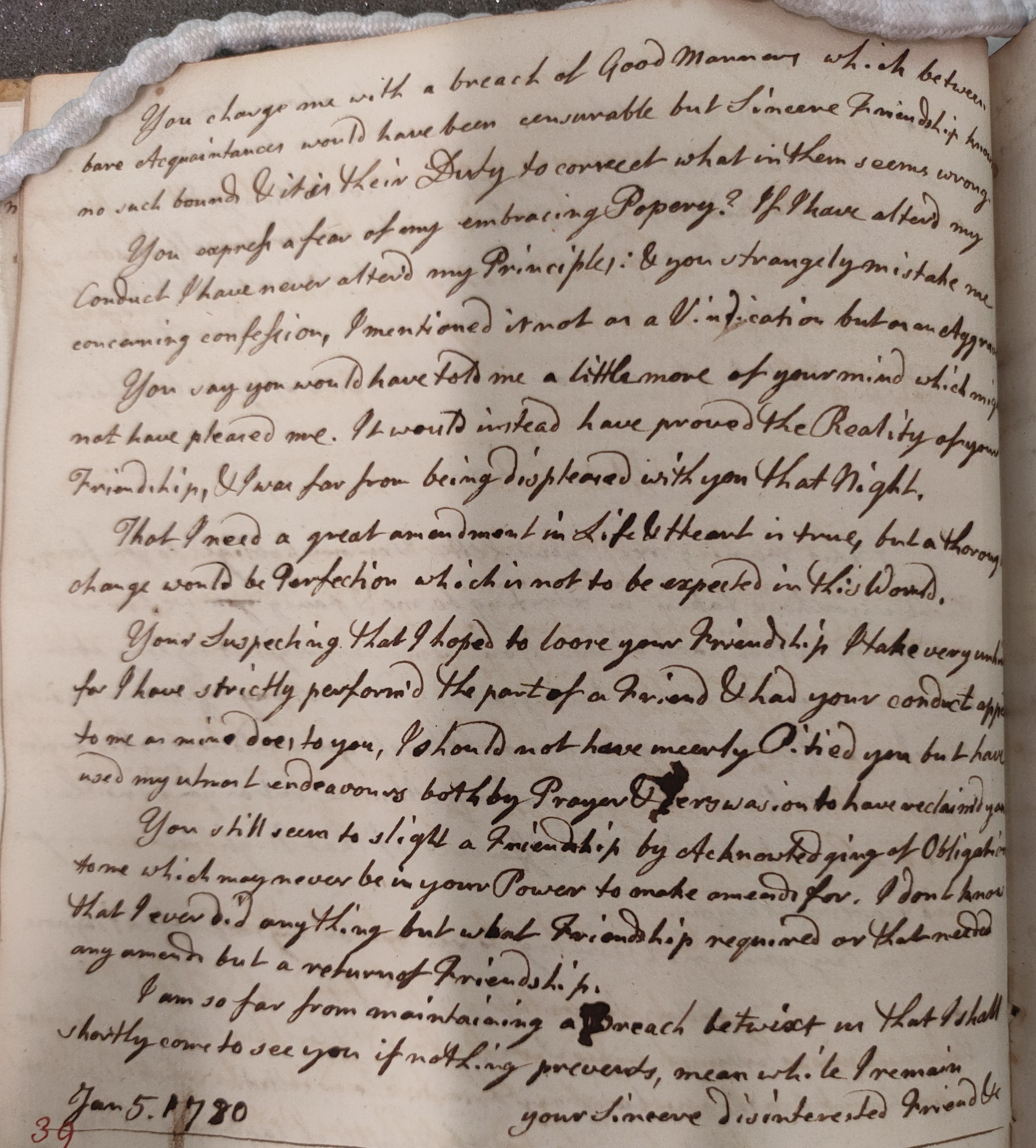3332 - Edward Baker to Polly Dix, 5 January 1780
- Transcription
- Letter Details
- How to Cite
Image 1 of 2

Image 2 of 2

Image 1
Miss Dix
I this morning [?read] your letter & am much obliged to you for [?y.]
trouble you have taken in writing to me & fancy y̶o̶u̶ we have not
rightly understood each other. You seemed surprised of my long absence
which was occasioned by my having a bad cold & not any affront on my side
therefore as I expected you so near I thought you would have called or else
have wrote to [?know] the reason of my absence, but as you did neither
& did not [?know] but what the difference of that night remained in your
mind & prevented you.
You [?lay] your not coming to [?vex] [?me or] myself which I suppose
you [?ground] on my letter to you of [?y.] 24th of March last, but [?y.] [?intimacy]
have meant between you & my sister, you will [?there] find my [?desire] of having
an addition of 1 to the number of my friends. the [?recollection] of which one would
have imagined would have saved you the trouble of explaining the difference
between your friendship & your affections. As for my giving you [?y] 1st place
among my friend it is purely [?disinterested] & whom I find as a person to place my
affections upon, then will be time enough to alter the expresion.
you
Image 2
You charge me with a breach of good manners which between
[?bave] Acquaintances would have been [?censurable] but sincere friendship [illeg]
[?mo] such bound & it is their duty to correct what in them seems wrong.
You expres a fear of my embracing Popery? If I have altered my
conduct I have never altered my principles: & you strangely mistake me
concerning confesion, I mentioned it not as a vindication but as an [illeg]
You say you would have told me a little more of your mind which [?might]
not have pleased me. It would instead have proved the Reality of your
friendship, & I was far from being displeased with you that night.
That I need a great [?amendment] in life & [?heart] is true, but a thorough
change would be perfection which is not to be expected in this world.
Your suspecting that I hoped to [?loose] your friendship [?&] take very [illeg]
for I have strictly performed the part of friend & had your conduct [illeg]
to me as mine does to you, I should not have merely [?pitied] you but have
used my utmost endeavours both by prayer & [?persuasion] was i on to have [?reclaimed] you
You still seem to slight a friendship by acknowledging of obligation that
to me which may never be in your power to make amends for. I dont know
that I ever did anything but what friendship required or that needed
any amend but a return of friendship.
I am so far from maintaining a breach betwixt us that I shall
shortly come to see you if nothing prevents, mean while I remain
your sincere disinterested friend [?&]
Jan 5. 1780
Edward Baker to Polly Dix, 5 January 1780
Copy letter from a letter book. After a disagreement, Miss Dix has eventually written and he responds gratefully. He explains his long absence and reflects on the nature of their friendship, which is different from affection. He also defends himself against her criticisms, including his 'embracing Popery', but admits he needs to change his behaviour.
Baker Family Papers
CLC/423/MS16927
London Archives
1780
1
5
Jan 5. 1780
To Cite this Letter
Edward Baker to Polly Dix, 5 January 1780, 511780: London Archives, Baker Family Papers, CLC/423/MS16927
To Cite this Edition
Material Identities, Social Bodies: Embodiment in British Letters c.1680-1820. Compiled by: Karen Harvey, Helen Esfandiary, Sarah Fox, Emily Vine, University of Birmingham. Project funded by the Leverhulme Trust (2021-2025, Ref. RPG-2020-163), https://socialbodies.bham.ac.uk.